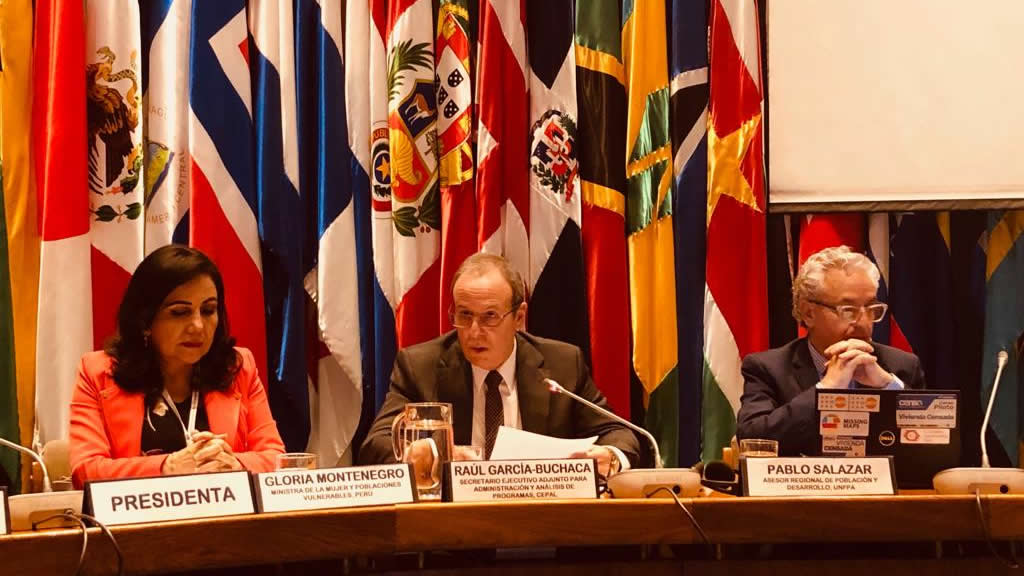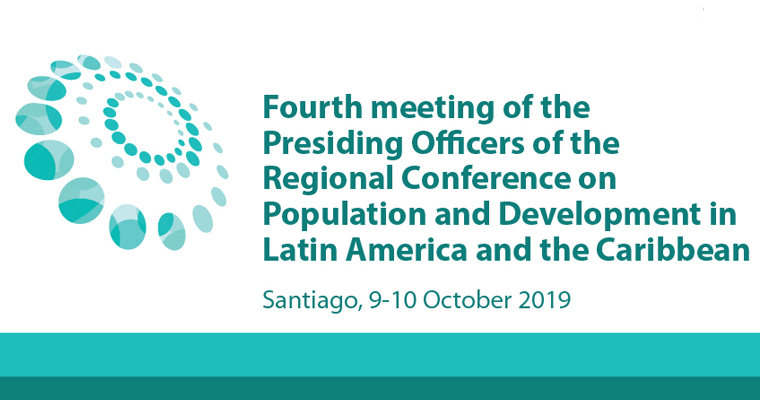Countries from the Region Renew Commitment to the Well-Being of the Most Vulnerable at Gathering on Population and Development Held at ECLAC
Work area(s)
Participants in the meeting include 24 delegations of ministers and authorities from member countries of the Regional Conference on Population and Development, along with representatives of the UN system and civil society.

The Fourth Meeting of the Presiding Officers of the Regional Conference on Population and Development in Latin America and the Caribbean was inaugurated today at the headquarters of the Economic Commission for Latin America and the Caribbean (ECLAC) in Santiago, Chile, with a renewed commitment to human rights and the well-being of those most vulnerable, as well as a call to intensify the fight against inequality and the eradication of poverty, in the framework of the commitments adopted in the Montevideo Consensus.
The meeting was inaugurated by Gloria Montenegro Figueroa, Minister for Women’s Affairs and Vulnerable Populations of Peru, in her capacity as Chair of the Presiding Officers of the Regional Conference on Population and Development in Latin America and the Caribbean; Raúl García-Buchaca, ECLAC’s Deputy Executive Secretary for Management and Program Analysis; and Pablo Salazar, Regional Advisor on Population and Development at the Regional Office for Latin America and the Caribbean of the United Nations Population Fund (UNFPA).
In his opening remarks, Raúl García-Buchaca reaffirmed ECLAC’s commitment to the implementation of the Montevideo Consensus and the 2030 Agenda.
“It never hurts to reiterate that the focus of this meeting will be on people and it will be centered on them. And that is because the Montevideo Consensus on Population and Development constitutes a true navigational chart that outlines the regional commitments whose advancement contributes, in a critical way, to the fulfillment of the 2030 Agenda’s Sustainable Development Goals and helps us make the principle of leaving no one behind a reality,” he stated.
García-Buchaca added that, while significant progress has been made on implementation of the Montevideo Consensus, six years after its adoption, it is constantly repeated that Latin America and the Caribbean continues to be the most unequal region in the world.
“Inequality manifests itself in many ways, in the large disparities in income distribution, in the distribution of assets and political and economic power, and in the multiple gaps that affect the full exercise of economic, social and cultural rights. For that reason, equality has been and continues to be present in ECLAC’s daily institutional work, as part of its DNA, as numerous position documents from the last decade demonstrate,” he indicated.
Meanwhile, in his remarks, Pablo Salazar emphasized that 25 years later, the Conference on Population finds the region at a juncture marked by tensions and contradictions.
“On the one hand, we can see legal advances on designing and implementing policies that enable some progress on compliance with the 2030 Agenda, and on reducing inequalities between groups. On the other hand, strong opposition by movements that are against human rights is undermining state support for population and development agendas,” he sustained.
The UNFPA advisor reiterated the United Nations Population Fund’s global and regional commitment to accompanying the region’s countries and civil society in their drive to spur implementation of the Montevideo Consensus on Population and Development.
Separately, Minister Gloria Montenegro thanked ECLAC for the efforts deployed and thanked UNFPA for its constant contribution to positioning population and development issues.
“We have all arrived here with the shared view that the Montevideo Consensus on Population and Development is the region’s road map for achieving a more egalitarian society and building a system that ensures greater levels of well-being for the entire population, without any kind of exclusion,” she said.
The Minister added that the Montevideo Consensus encompasses a series of concrete measures to promote the well-being of all population groups.
The Fourth Meeting of the Presiding Officers of the Regional Conference on Population and Development is being attended by ministers and authorities from the member countries of the Regional Conference on Population and Development, along with representatives of the United Nations system and civil society.
Among its objectives, the meeting will consider the report of the Working Group on Indicators for Regional Follow-Up of the Montevideo Consensus on Population and Development, as well as a prototype of the virtual platform to contribute to regional follow-up of the Consensus.
Related event

Fourth meeting Presiding Officers of the Regional Conference on Population and Development in Latin America and the Caribbean
Esta reunión tiene entre sus objetivos examinar el informe del Grupo de trabajo sobre indicadores para el seguimiento regional del Consenso de Montevideo sobre Población y Desarrollo; presentar el…
Related link(s)
Country(ies)
- Latin America and the Caribbean
Contact
Public Information Unit
- prensa@cepal.org
- (56 2) 2210 2040
